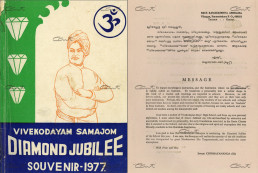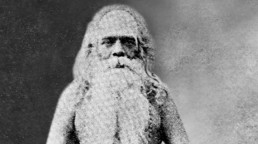Let us be Hindus
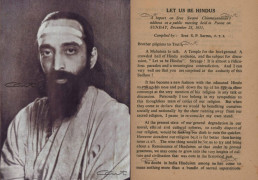
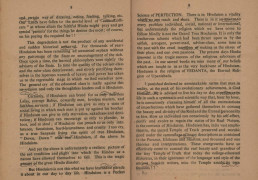
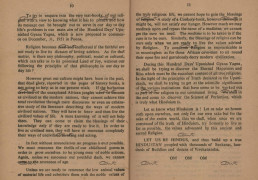



LET US BE HINDUS
A report on Shree Swami Chinmayananda’s address at a public meeting held in Poona on Sunday, December 23rd 1951.
Compiled by: Shree S.P.Sarma, F.T.S
Brother pilgrims to Truth,
A Mahatma to talk. A temple for the background. A crowded hall of Hindu audience, and the subject for discussion, “Let us be Hindus”. Strange! It is almost a ridiculous paradox and a meaningless contradiction. And I can very well see that you are surprised at the audacity of this Sadhu!
It has become a new fashion with the educated Hindu to turn up his nose and sneer in contempt at the very mention of his religion in any discussion. Personally, I too belong in my sympathies to these critics of our religion. But when this thoughtless team begins to declare that we would benefit ourselves socially and nationally by running away from our sacred religion, I pause to reconsider my own stand.
At the present state of moral, ethical and cultural degradation in our country, to totally dispose off religion would be making our dash to ruin the quicker. However decadent our religion may be, it is far better than having none at all. My proposal is that the wise thing would be for us to try and bring about a renaissance of Hinduism so that under its greatness – proved through many centuries – we may come to grow into the very heights of culture and civilization that was ours in the historical past.
No doubt, in India, Hinduism has come to mean nothing more than a bundle of sacred superstitions, or a certain way of dressing, cooking, eating, talking, and so on. Our gods have fallen to the mortal level of administration officers at whose altars the faithful Hindu might pray and get special permits for the things he desires; that is, if he pays the required fee to the priest!
This degradation is not the product of any accidental and sudden historical upheaval. For two hundred years Hinduism has remained an unwanted orphan without any patronage of the state and little encouragement of the rich. Once upon a time, the learned philosophers were rightly advisers of the state. But the quality of the adviser class (Brahmin) and the ruler class (Kshatriya) deteriorated. By slowly putrefying themselves in the leprous warmth of luxury and power, they have taken us to the regrettable stage in which we find ourselves now. The general cry of the educated class is really against this un-religion. However, it is only the thoughtless, uninformed leaders who call this Hinduism.
Certainly, if Hinduism can breed for us only heartless lalas (shopkeepers), corrupt babus (clerks), cowardly men, loveless masters and faithless servants; if Hinduism can give us only a state of social living in which each man is put up against his brother, if Hinduism can give us only starvation, nakedness and destitution; if Hinduism can only encourage us only to plunder, to loot and to steal; if Hinduism can preach to us only intolerance, fanaticism, hard heartedness, and cruelty; then I too cry, “Down, Down ” with that Hinduism.
And yet the above is a realistic picture of the sad condition and plight into which the Hindu people, as a nation, have allowed themselves to fall. This is the tragic picture of the great Hindu disaster in the present day India.
But Hinduism is not this external show that we have learned to parade it about in our daily lives. Hinduism is a Perfect science of PERFECTION. There is in it an answer to every individual, social, national, or international problem. But, unfortunately, the religion which we have come to follow blindly, is not the Grand True Hinduism. It is only the treacherous scheme thrust upon us some time in the past by the selfish, arrogant, power-mad priest class whose intention was to make us slaves of their plans and our own passions. The present days Hindu ignomini is the tragic success of these religious saboteurs of the past. In our sacred books we miss many of our beliefs which are taught to us as the very backbone of Hinduism. Hinduism is the religion of VEDANTA, the Eternal Religion of Upanishads.
The Upanishads declare in unmistakable terms that in reality man – at the peak of his achievements – is God Himself. He is advised to live his day-to-day experiences in life in such a systematic and scientific way that hour by hour, he is consciously cleansing himself of all the encrustation of imperfections that have gathered to conceal the beauty and divinity of the true Eternal Personality in him. The methods by which an individual can consciously purify and evolve by his self–effort to regain the status of his True Nature is the content of Hinduism. Hinduism in its vast amphitheater has preserved and worshipped, under the camouflage of the heavy descriptions contained in the puranas, shastras (scriptures), and their commentaries of thousand different interpretations. This overgrowth has so effectively come to conceal the real beauty and grandeur of this tiny temple of Truth that today the college educated illiterates, in their ignorance of the language and style of the ancient Sanskrit writers, miss the temple amidst its own festoons.
To inquire into the very textbooks of our religion with a view to knowing what Hinduism has to teach, and how its message can be used to save us as we face the problems of our daily lives, is the aim of the One hundred days’ Upanishad Gnana Yagna, which is now proposed to commence on December 31, 1951, here in Poona.
Religion becomes dead and ineffectual if the seekers are not ready to live its ideals. For that matter, is there any philosophy – political, social, or cultural – which can take us to its promised land of success, without our following its principles in our day – to – day living?
However great our culture might have been in the past, that dead glory, reported in the pages of history books, is not going to help us in our present trials. If the barbarous cavemen of the unexplored jungles want to become as civilized as the men of modern nations, they cannot achieve this total revolution through mere discourses, or even through an exhaustive study of the literature describing the ways of the modern civilized nations. They will have to know and then live the civilized values of life. A mere knowing of it will not help them. They can claim the blessings of their knowledge only if they are ready to live what they know. In order to live as civilized men, they will have to renounce completely their ways of uncivilized thinking and acting.
In fact, without renunciation no progress is ever possible. We must renounce the thrills of our childhood games in order to grow to be young men of noble actions. Again, unless we renounce our youthful spirit, we cannot come to the reverence of old age.
Unless we are ready to renounce the low animal values of material life and replace them with the noble values of the truly religious life, we cannot hope to gain the blessings of religion. A study of a cookbook, however thorough it might be, will not satisfy our hunger. No matter how long we meditate upon and repeat the name of the medicine, we cannot get the cure we need until we actually take the medicine. Similarly, the blessings of religion can be ours only when we are ready to live the recommended values. To condemn unpracticed religion is as meaningless as those cavemen sitting around their open fire, and querulously decrying advanced civilization.
During these one hundred days of the Upanishad Gnana Yagna, we shall be trying to discover the Eternal Happiness and Bliss that is the succulent essence of all true religions. In light of the principles of Truth declared in the Upanishads, we shall be trying to get at the scientific significance of the various practices that are considered part of our religion. In a spirit of communal living for these one hundred days we shall come to discover the science of PERFECTION, the true essence of Hinduism.
Let us know what Hinduism is! Let us take an honest oath for ourselves, not only for our own sake, but for the sake of the entire world:, that we shall, when once we are convinced of the validity of the Eternal Truth, try honestly to live as consistently as possible the values advocated by this ancient and sacred religion.
LET US BE HINDUS, and thus build up a true HINDUSTAN (Home of the Hindus) peopled with thousands of Shankaras, hundreds of Buddhas, and dozens of Vivekanandas!
OM ! OM ! OM !
Gurudev's message to his school
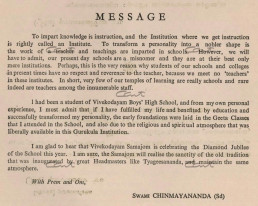
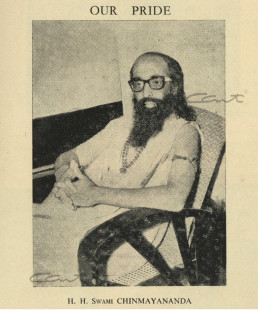
MESSAGE
To impart knowledge is instruction, and the Institution where we get instruction is rightly called an Institute. To transform a personality into a nobler shape is the work of a teacher and teachings are imparted in schools. However, we will have to admit, our present day schools are a misnomer and they are at their best only mere institutions. Perhaps, this is the very reason why students of our schools and colleges in present times have no respect and reverence to the teacher, because we meet no ‘teachers’ in these institutes. In short, very few of our temples of learning are really schools and rare indeed are teachers among the innumerable staff.
I had been a student of Vivekodayam Boys’ High School, and from my own personal experience, I must admit that if I have fulfilled my life and benefited by education and successfully transformed my personality, the early foundations were laid in the Geeta Classes that I attended in the School, and also due to the religious and spiritual atmosphere that was liberally available in this Gurukula Institution.
I am glad to hear that Vivekodayam Samajom is celebrating the Diamond Jubilee of the School this year. I am sure, the Samajom will realise the sanctity of the old tradition that was inaugurated by great Headmasters like Tyageesananda, and maintain the same atmosphere.
With Prem and Om,
SWAMI CHINMAYANANDA (Sd)
Note: This message was published in the Diamond Jubilee souvenir of Vivekodayam Boys High School.
Champion Magazine Article
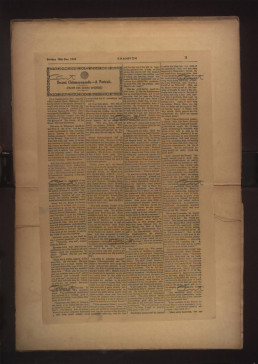
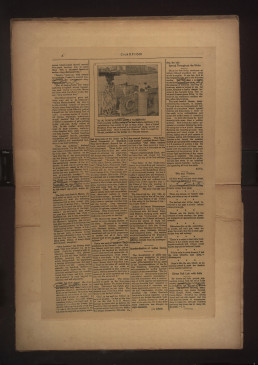
SWAMI CHINMAYANANDA – A PORTRAIT
FROM HIS OWN WORDS
This article was published on 18th December, 1949
[Our representative who recently visited Ananda Kutir, Rishikesh, the headquarters of Sivananda Swamiji’s world-wide Divine Life Society, presents to the readers a portrait of Siva’s great disciple, Sri Swami Chinmayananda Saraswathi. Our representative warmed himself into the confidence of ‘Chinmaya’ and has got this glimpse of “the vision of the times” that was the Swami.
The story of ‘Chinmaya’ would be the story of all of us, had we the mental equipment to feel, the intellectual honesty to think, and the darling courage of conviction to act, as the Swamy. Very few of us are born that way; and none of us had any training to develop these qualities: hence we silently submit to our cruel lot, forcing out a smile now and then, only to relieve the monotony of our perpetual tears! Thus refreshed with our momentary smiles, we helplessly sit back again to weep out our miseries. This is our life.
And, this was exactly the life that faced ‘Chinmaya’ as he walked out of the University. Let the Swami himself speak. Listen how he reached to this modern life and pioneered towards his discovery of the real LIFE. – Editor.]
At Rishikesh, on the banks of the Ganga’s Silvery march, is Ananda Kutir, Sri Swami Sivanandaji’s Ashram. Aghast at the institution and its varied activities of guiding, instructing, and encouraging the saint’s numberless disciples all over the world, we silently watched. The more we watched the more we learnt!
Many are the bright luminaries in the team of workers that conduct the institution; by far, the brightest is Siva’s great disciple, Sri Swami Chinmayananda Saraswathi. It was most fortunate of us to get ‘Chinmaya’ freely to ourselves for an hour one afternoon, and we shot dozens of questions to him. The cool confidence and sympathetic understanding with which he answered all our skeptical questions on God and Spiritual Life, gave us the courage to expose the worst of our own curiosity.
“Swamiji, excuse us, but shall we ask a personal question?” we ventured. “Certainly, why not,” smiled back the Swami.
Knowing fully well that it is unpardonable for a Sat-Sangi to ask any Sadhu about his poorvashram, we asked: “Swami why did you take Sannyas?”
There was a visible tension in his calm face. He was alert. His eyes wandered for a moment among the correspondence-files, type-writer, and the many volumes that lay scattered about him. “What else do you expect any sensible man to do?” asked the Swamy, half to himself, “would you have me,” he shot at us “marry, breed, fight and talk shop till wrecked with age and sorrow, this body drops down dead?”
The criticism on life was fiery. It set us all thinking. We remained silent. The professional satisfaction was replaced by a welling gush of sorrow and futility; from where they came we knew not.
“Chinmaya was tired of living in the tomb, so he walked into the open to breathe, to bask, to work and to live.” The Swamy was all ablaze. None of us even suspected that such a frail body could contain such a consuming fire of earnestness and sincerity.
All of us were silent. The war of the Ganga rose up to reach the modest one-roomed kutir of Chinmaya. The Swamy sat looking out into the glittering flow of the immortal river. It was a roar of silence that smothered our values and lay heavy on our sinned bosom. As an escape, we dared: “But you have not answered our question, Swamiji. Why should you, educated, young, and so efficient, smart and spirited as you are, kick away life and take to Guruva?”
Swami Chinmayananda had by then calmed down. He even smiled, and looking at the time-piece in his room, said: “That is a big question. To answer it a few words on this Sareera’s birth and growth would be necessary. For an hour Chinmaya is free; it is all Siva’s wish. Parameswararpanam Sarwam.” The Swamiji for a moment closed his eyes in devotion and prayer.
“Thirty years ago,” the Swami started, as he slowly opened his eyes, “this Sadhu took his body in Poothampalli House, in Ernakulam, with the late sister of Sri P. Neelakanda Menon (Bar-at-Law, Retired Chief Justice of Cochin) as his mother, and Trichur, Vadakke Kurupath Kuttan Menon (Retd. Munsiff, Cochin State), as his father. This eldest son has two sisters, who are now in Cochin well-settled. The son, Balakrishnan, grew up amidst the family as a pet of both Sri Swami Chattambi Swamigal and Sri Yogiraj Bhairavananda, who were the Kula-Gurus of the house.”
“The daily evening Poojas of the strict and extremely religious house, the insistence that the children should have their Japa and Namasankirtan every day at dusk – these gave him a great push in the illustrious Path of Devotion. Balan’s prayers would probably end in half an hour; but the elaborate daily Pooja would lengthen to some two hours. The child is not allowed to move out of the Pooja-room before Arathi either. And, thus compelled to resist sleep and somehow stick to his seat till the end, the child grew extremely imaginative: during this endless vigil he asked a thousand questions to himself regarding the ‘why’ and the ‘whereof’ of the whole “show,” he got no answer; only this problem got all the more knotty for the questioning.”
“In order to entertain himself,” Swami Chinmayanandaji said, “the Balan in this sadhu then sat gazing at the innumerable pictures of our Gods: the Raja Rajeswari seemed too majestic to play with! Mother Amba too dangerous to approach as she sat on a lonely lotus in the midst of a threatening sea! Lord Krishna often looked too childish to be quite friendly – unless of-course Balan was ready to do such things as play with cows and calfs, a game strictly banned by the cane. Sri Saraswathi attracted the child, and he in vain tried often to catch some note from Her Veena; Sri Lakshmi was to him again more dexterous a Lady of balance to stand so erectly on a lotus flower!”
“What attracted Balan,” here the Swami in deep reverence closed his eyes, and suited his temperament the most was the picture of the Chandrakaladhara – bust only, with Sri Gangaji flowing out of his jada so beautifully gathered into a heap on His crown; the crescent and the serpant; the broad forehead; the smiling eyes of mercy; the beaming mouth that seemed to talk of tenderness and affections from behind His mustache! In short Siva was the picture after Balan’s own heart.”
“But the child had to spend two solid hours. To him the Sahasranama was an unending torture, and he felt sure that had he been the Divine Mother, he would not have cared to sit, even for a single day, as long as all that under the mounting heap of flowers. He wondered at the meaningless cruelty of his Cheriyammas to make the Lady of the Lotus Flower suffer so much and that too for so long. But Balan’s wonder was silent, his anger impotent; against the ever-threatening cane in the [Malayalam words] which child would ever have the guts to express what he felt of his elder’s stupidities?”
“Thus grew the child. Each day he found his solace in Lord Chandrakaladhara and His smile. To imagine how He in the bust must be sitting, how shapely could be His legs and arms, what could be His clothes – these entertained the weary child in his waiting for the Arathi. He knew fully well that, if to dose is pardonable, to sleep in the Pooja room was to invite the unanimous uproar of a team of outraged Cheriyammas. They would make Balan feel that in the illustrious line of Poothampalli Menons such a Ravana-Hiranykashipu-combination should appear was surely the vengeance of our dissatisfied Kula-Devati! That is serious!”
“It was during those days of waiting for the Pooja-end” pointed out Swami Chinmayanandaji, and there was a distant thoughtful look in him when he explained, “that Swami Chinmaya was born in Balan the frail child. Somehow then Balan stumbled on a new game: to look at the picture of his Lord, then shutting the eyes to see Him exactly as he was in the picture, in the darkness within! This game gave Balan a job to sweet and pleasant that it became a habit with him to call His Form at all hours into his mental screen of darkness! The picture came readily as it was ‘ordered’; his wonder grew at his own successes.”
“It took now more than 20 years,” added the Swami, as an aside, “to realise that in that strange game Balan had been initiated into the Jnana Marga – the Path of Knowledge – by Sri Parameswara Himself!! Om Namasivaya! Glory to the Bhaktavatsala! No sincere Heart-offering is rejected or ignored by Him, even if it be soiled by our selfish motives!! Even as an escape run to Him, the Lord shall never desert thee!”
“The child grew up. The monstrous practice of Malabar in leaving a child out of all spiritual discipline as soon as it grows to be scarcely ten years of age ruined the meditator in Balan. The child found freedom; the beach, the games, and the lessons robbed off the leisure and the mental poise to meditate. Yet, he felt that he could not compose himself to sleep without repeating Om-Nama-Sivaya for at least half an hour. He knew not the meaning of jap, yet he went on doing it regularly, more because he imagined to be an effective talisman against bad frightening dreams.”
“Years passed by. The tall slender Balakrishnan Menon reached the college. By then he had become extremely bloated of head and intoxicated at heart. The early habit of asking questions even at obvious things and relationships grew with the bones. He came to ask now such dangerous questions as, “Why should there be a God,” “Is there a need to pray to Him even if He be?”
The Swami paused and he seemed to gather his ideas into the folds of his expressions. “See: this was what happened to Balakrishnan Menon. He has heard from here and there that “if individuals be mere sparks, He is the conflagration; He is the sun and every living being but a ray of His: He is the WHOLE, each of us is a PART of the WHOLE.” This set the Menon thinking, and in his immaturity of thought, he came to the conclusion that since even in the best of us there was only a tiny part, scarcely 20% of goodness, what must be the WHOLE but a huge caldron of striking evil. Again, if there were the various Balans there was the God, so Balan was the source of God, not God the source of Balan: then why should Balan pray to his own out-growths: the God? – so argued the stupid youth.”
“Alas!” Swami Chinmaya piteously sighed, “with this Balan divorced God from him and wandered aimlessly through an empty life of inner gloom, questioning to everyone with whom he felt safe to open up his doubt – wondering, whether it be really sure that such as easy argument could overthrow God – and struggling – for, something kept on warning him in his heart that there was a serious flaw somewhere in his line of argument. But his intellectual honesty would not easily brook any blind faith.”
“And,” revealed the Swami, “strangely enough, even in those days, pocketing all self-dignity he used to do regularly his jap secretly in bed! The compromise was painful – yet, he went on to submitting to the inner-voice for a long time. The spiritual Balan persisted as a shadow in the background of Balan the unconvinced, till the day when he left home to join the Lucknow University. With the complete severing from the higher values of the Life Divine, the passionate blind animal in Balan rose up: the Mr. Menon of Lucknow is even to-day, among the staff and students, a topic to moralise and an instance to quote when they sit round to discuss the depths of degradation into which modern students have sunk. In carelessness, ungodliness, immortality, stupidity, and extravagance, there was none then to beat Mr. Menon.”
“From the University he walked out, a perfect peacock, with an M.A. (Eng.) for its tail! His vanity increased. His daring was supreme, in short Mr. Menon M.A. (Eng.) strided out to meet Life, supremely confident that he can just for the asking, fix himself up comfortably in one of its ‘Luxuary-flats’!! But at that guarded entrance to Life none is admitted who has not a healthy character, a good disposition, a charming friendliness and a bending hip! At the Gate of Life alone did he realise that he was poor in real wealth!”
The serious grave face melted into a mischievous smile when ‘Chinmaya’ continued his story. “However there is a ditch-door as the backyard, through which some few had crept in to live later on successfully in one of the ‘luxury-flats.’
Through journalism the youth, disappointed at the main gate, dashed into Life’s distant lawns, and Sri P.B.K. Menon succeeded in approaching one of the far-away empty duck-chairs and sit back, comfortable and secure! A few hours in the court-yard of Life’s Palace and he felt that not even the risk-in-the-game could add gin to the banging monotony in the atmosphere.”
“The wandering notes of some smothered music passionately hurried to drench the ears of the intruder they disappointed him.”
“Some residents of the Palace, taking Menon to be a permanent member made conventional friendly advances – they tired him. Many early-successes, fair and young, voluptuously danced around this youth inviting him to court them with a thousand lascivious smiles – they distracted him. Beauty, made-up with creams and powders, flocked in scented bunches round the new-commer – they disgusted him. Men of cheque-books and vague authority competed among themselves, each trying to impress Menon the more with his affairs in the Palace – they nauseated him.”
The Swami seemed to grow suddenly very sad as he continued: “Slowly Menon hustled his way on to the crowded veranda of men and women busy doing nothing, and from there without much difficulty pushed himself into the very stinking Hall of Life! A roaring welter of unnatural values, impossible behaviours, stupid vanities! Sick and suffering revealed a generation of pale animals in the pell-mell, stuffy within of Life. In this studied smiles were tears; in their insincere, made-to-order-laughter were sighs of voice-less deep regrets. In their heartless love, concealed hatreds, grudging sympathies, and poisonous rivalries each suffered, and contributed lavishly to the total suffering.”
“This was sufficient,” declared Chinmayananda, “for Mr. Menon. He saw what a Godless animal life could be at its best. He decided on the very first day of his great-crashing into the Palace of Life to quit it for good! Out of the Palace walls were the uncharted deserts of the unknown; to walk out of Life is easy: no questions are asked at the Gate and no lies told!; but Menon had to answer his own questions: “to whither ye miserable stranger?” He decided to seek for himself the meaning of true Life and learn to follow the lonely path of Divine Life which would lead all the pilgrims to the brilliant domains of perfection. That he felt would be LIFE worth living.”
The japa came back to Menon. He took them up again, not in a spirit of defeatism, out with the refreshing realisation that he was a mere pilgrim on the Unknown Path; he must discover for himself the turns in the route and the charming of the destination! He didn’t know then what the goal was – whither that Path of Sadhana led; but it was consolation enough and encouragement sufficient for Menon to recognise the simple fact that the path of Life Divine was NOT running parallel to the tarred roads leading to the Palace of Life. Whatever be the destination reached by the new path, to Menon it was more admirable in that it would not any way take him back to the same noisy Palace of hurry-burry and mutual slaughter.”
“This decision,” the Swamy continued, “was soon followed by an intense study of philosophy both Indian and European. Dry philosophy, if it now and then thrilled the intellect, generally left the spirit sorely disappointed. In impatience a surging enthusiasm torn the aspirant within, into bits [wonting] in his sincerity the Spiritual Sadhak in Menon vainly chewed his bit. His erstwhile subdued faith and devotion found their voices and they roared and thundered in their demand for freedom and self-expression.”
“Jai Sat-Chit-Anand Sat-Guru Maharaj!” Simple these words be, but admirable they indeed were to express the warmth of the Swami’s adoration to his Gurudev. So sudden was this turn in the emotion of the narrator, that it caught us napping: it took a few frantic moments within ourselves to gauge the depth and intensity of……..but, the Swami had already taken up the story of his life. “It was at this crucial moment in his life that aspirant accidently stumbled upon some of the books by Sri Swami Sivanandaji of Rishikesh. They saved Menon; directed his efforts; explained, comforted, cheered and encouraged. Those books put him on the Road to God, and maintained him all along his pilgrimage. The doubts were solved. The Path became clear. Philosophical volumes disappeared. “Be good, Do good,” “Serve, Love, Purify, meditate, Realise,” “Keep Siva’s Trisul (the Spiritual Diary, Resolutions and Mantra writing) and be free” – practice of these became Life. This change gave the abominable Life in the Palace a newer zest and a nobler meaning.”
“For three years Menon secretly pursued a life of strict spiritual discipline, remaining in the very Palace of Life ever noisy with its gruesome agitations. They divinised ideologies to excuse their barbarous selfishness; discovered engines to crush their fellow-beings; perfected their arguments to torcher the poor; enunciated laws to tyranise over the weak and the honest. They denounced simplicity and self- control, claimed a culture of ugliness, rejected love and kindness. They maneuvered revolution to bring about, not happiness to the many, but power to the few.”
“Mr. Menon was never idle. He reacted to every changing rhythm of his times. He peeped in to study every boosted solution, suggested plan, discussed scheme, distributed Manifesto. Each Social, National, International and one world programme he studied and all of them only grinned back at him in their ghastly ugliness!”
There was such a pang of disappointment in the Swami’s voice that any listener could have easily got an inkling of the impotent ire which the youth must have had against the organised incompetency of his times! “Such a close study of the feverish activities of the Palace Life convinced Menon, that if that were Life, he would be far better off amidst the Dead – whatever be the mode of existence available in that unknown realm. Nothing seemed to have ever a chance to be more degraded and foul than the life as he saw it.”
The Swami paused. The silence seemed to grow as the time-piece ticked louder! We looked at each other. ‘Chinmaya’ sat, lightly playing with his pen, on his Asan. The slanting rays of the Sun added more Guru to the Sadhu’s clothes.
“Yes,” at last said the Swami almost to himself, “it was at this time of his life that P.B.K. Menon, curious to know what an Ashram life would be like and eagerly thirsting to meet his saviour and unknown Master Sri Swami Sivanandaji Maharaj, one day reached Rishikesh. This Sadhu must confess,” confided Swami Chinmayanandaji, “that Balan reached the feet of his Guru more as a deserter of life, than as a Columbus on the shores of America.”
“Menon entered Ananda Kutir, saw his Guru Dev, and stayed for the day – for the day of his final redumption.”
“That Balan of the Pooja room, instinctively loved Siva and innocently lived; – the same child, when given up to become Sri Balakrishna Menon in his intellectual honesty (or was it vanity?) rejected Siva and wondered; – later on, he divorced himself completely from Siva and suffered – his rediscovery of Siva kept him sane in the Palace of Life – his meeting of Siva gave him the Life,” concluded Chinmaya. The hour had just then run out.
The Swami got up, and with an Om Manasivaya he was off ‘on duty,’ to guide other Balans of the Palace of Life safely to the Heaven of joy – the Anand Kutir!!
[Editor: Sri Swami Chinmayananda Saraswathi is now in Uttarkasi (Himalayas) with Sri Swami Tapovanji Maharaj, studying at the sacred feet of this Vidwan-saint of the Uttarakhand, the Vedanta philosophy. Even in his retreat of study and contemplation Chinmaya cannot but be the product of Siva the Divine Lifer. From Uttarkasi the Swami is directing many Sadhaks through their respective Paths. Our readers would be benefited by Sri Swamiji’s gracious permission to publish in columns extracts from his correspondence files.]
Secret Initiation Article
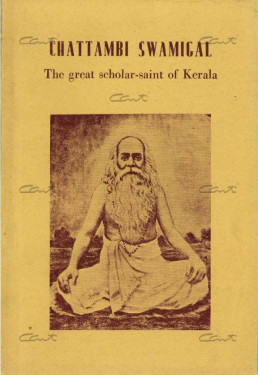
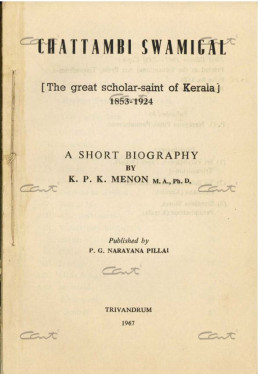
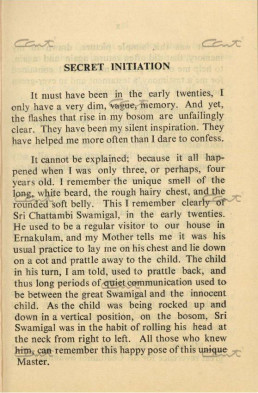
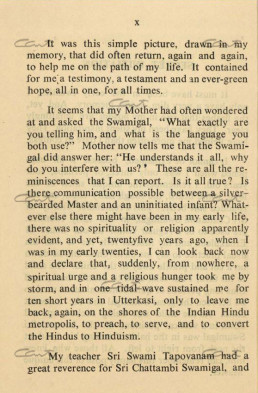
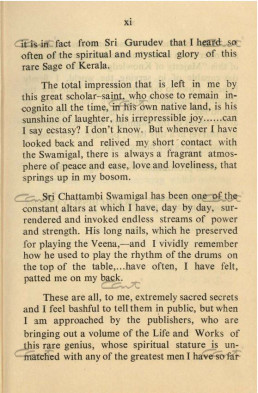
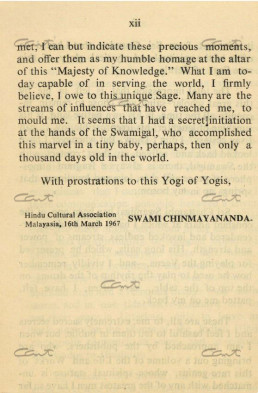
CHATTAMBI SWAMIGAL
(The great scholar-saint of Kerala)
1853-1924
A SHORT BIOGRAPHY
BY
K.P.K. MENON M.A., Ph.D.
Published by
P.G. NARAYANA PILLAI
TRIVANDRUM
1967
SECRET INITIATION
It must have been in the early twenties, I only have a very dim, vague, memory. And yet, the flashes that rise in my bosom are unfailingly clear. They have been my silent inspiration. They have helped me more often than I dare to confess.
It cannot be explained; because it all happened when I was only three, or perhaps, four years old. I remember the unique smell of the long, white beard, the rough hairy chest, and the rounded soft belly. This I remember clearly of
Sri Chattambi Swamigal, in the early twenties. He used to be a regular visitor to our house in Ernakulam, and my Mother tells me it was his usual practice to lay me on his chest and lie down on a cot and prattle away to the child. The child in his turn, I am told, used to prattle back, and thus long periods of quiet communication used to be between the great Swamigal and the innocent child. As the child was being rocked up and down in a vertical position, on the bosom, Sri Swamigal was in the habit of rolling his head at the neck from right to left. All those who knew him, can remember this happy pose of this unique Master.
It was this simple picture, drawn in my memory, that did often return, again and again, to help me on the path of my life. It contained for me a testimony, a testament and an ever-green hope, all in one, for all times.
It seems that my Mother had often wondered at and asked the Swamigal, “What exactly are you telling him, and what is the language you both use?” Mother now tells me that the Swamigal did answer her: “He understands it all, why do you interfere with us?” These are all the reminiscences that I can report. Is it all true? Is there communication possible between a silver-bearded Master and an uninitiated infant? Whatever else there might have been in my early life, there was no spirituality or religion apparently evident and yet, twenty five years ago, when I was in my early twenties, I can look back now and declare that, suddenly, from nowhere, a spiritual urge and a religious hunger took me by storm, and in one tidal-wave sustained me for ten short years in Utterkasi, only to leave me back, again, on the shores of the Indian Hindu metropolis, to preach, to serve, and to convert the Hindus to Hinduism.
My teacher Sri Swami Tapovanam had a great reverence for Sri Chattambi Swamigal, and it is in fact from Sri Gurudev that I heard so often of the spiritual and mystical glory of this rare Sage of Kerala.
The total impression that is left in me by this great scholar-saint, who chose to remain incognito all the time, in his own native land, is his sunshine of laughter, his irrepressible joy……can I say ecstasy? I don’t know. But whenever I have looked back and relived my short contact with the Swamigal, there is always a fragrant atmosphere of peace and ease, love and loveliness, that springs up in my bosom.
Sri Chattambi Swamigal has been one of the constant altars at which I have, day by day, surrendered and invoked endless streams of power and strength. His long nails, which he preserved for playing the Veena,- and I vividly remember how he used to play the rhythm of the drums on the top of the table,….have often, I have felt, patted me on my back.
These are all, to me, extremely sacred secrets and I feel bashful to tell them in public, but when I am approached by the publishers, who are bringing out a volume of the Life and Works of this rare genius, whose spiritual stature is unmatched with any of the greatest men I have so far met, I can but indicate these precious moments, and offer them as my humble homage at the altar of this “Majesty of Knowledge.” What I am today capable of in serving the world, I firmly believe, I owe to this unique Sage. Many are the streams of influences that have reached me, to mould me. It seems that I had a secret initiation at the hands of the Swamigal, who accomplished this marvel in a tiny baby, perhaps, then only a thousand days old in the world.
With prostrations to this Yogi of Yogis,
Hindu Cultural Association
Malaysia, 16th March 1967
SWAMI CHINMAYANANDA
